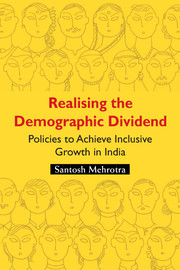Book contents
- Frontmatter
- Contents
- List of Tables and Figures
- Preface
- Acknowledgements
- Part 1 Growth, Employment and Inclusion
- Part 2 Human Capital Formation
- Part 3 Building a System of Social Protection
- Chapter 12 Minimising Leakages in Welfare Programmes: How to Identify the Poor Correctly?
- Chapter 13 Needed a Social Insurance System for Unorganised Workers below the Poverty Line
- Chapter 14 Introducing Cash Transfers: A Proposal for a Minimum Income Guarantee and Some CCTs
- Part 4 Governance
- Index
Chapter 13 - Needed a Social Insurance System for Unorganised Workers below the Poverty Line
from Part 3 - Building a System of Social Protection
Published online by Cambridge University Press: 05 June 2016
- Frontmatter
- Contents
- List of Tables and Figures
- Preface
- Acknowledgements
- Part 1 Growth, Employment and Inclusion
- Part 2 Human Capital Formation
- Part 3 Building a System of Social Protection
- Chapter 12 Minimising Leakages in Welfare Programmes: How to Identify the Poor Correctly?
- Chapter 13 Needed a Social Insurance System for Unorganised Workers below the Poverty Line
- Chapter 14 Introducing Cash Transfers: A Proposal for a Minimum Income Guarantee and Some CCTs
- Part 4 Governance
- Index
Summary
India is probably unique among developing countries, and certainly among emerging market economies and middle income countries, in having 93 per cent of its labour force in informal employment (defined as those who don't have any social insurance). This is a higher share than that found in both middle income Southeast Asia as well as Latin American economies. With such an overwhelming proportion of its workforce living without any social insurance and also with limited social assistance, and with 22 per cent of its population in 2011–12 (or 268 million persons) below the national poverty line, the question is inevitable: should the state be thinking seriously about ensuring basic social insurance for at least 268 million people?
If the state wishes to influence the quality of life of wage workers in the unorganised sector, it faces two courses of action. It could focus on improving the conditions of work in the unorganised enterprises, and/or it could act to bring such workers under a social insurance mechanism.
There is very little hope that the state can influence the work conditions of those in the unorganised sector. Can the state expect to successfully improve the conditions of work (for example, hours of work, hazardous nature of work and hence safety conditions, wage rates, which are all demands made in the otherwise excellent report of the National Commission on Enterprises in the Unorganised Sector – 2008) in the prevailing labour market conditions, where there is excess supply of labour, where the unorganised sector workers themselves are fragmented and not organised into unions, where they suffer from imperfect information, and where they are not fully aware of their limited rights and, to make it even more difficult, they are mostly illiterate or barely literate? If the pre-requisites for improving their conditions of work do not exist, it is obvious that the state should focus its attention on improving the social protection for such workers, i.e., social insurance and social assistance. That is, the state should prioritise this objective (Mehrotra, 2008). This is one of the central arguments of this chapter.
- Type
- Chapter
- Information
- Realising the Demographic DividendPolicies to Achieve Inclusive Growth in India, pp. 360 - 390Publisher: Cambridge University PressPrint publication year: 2015



